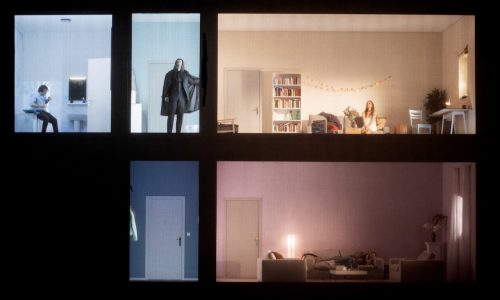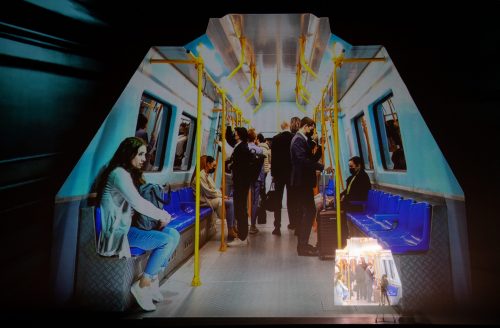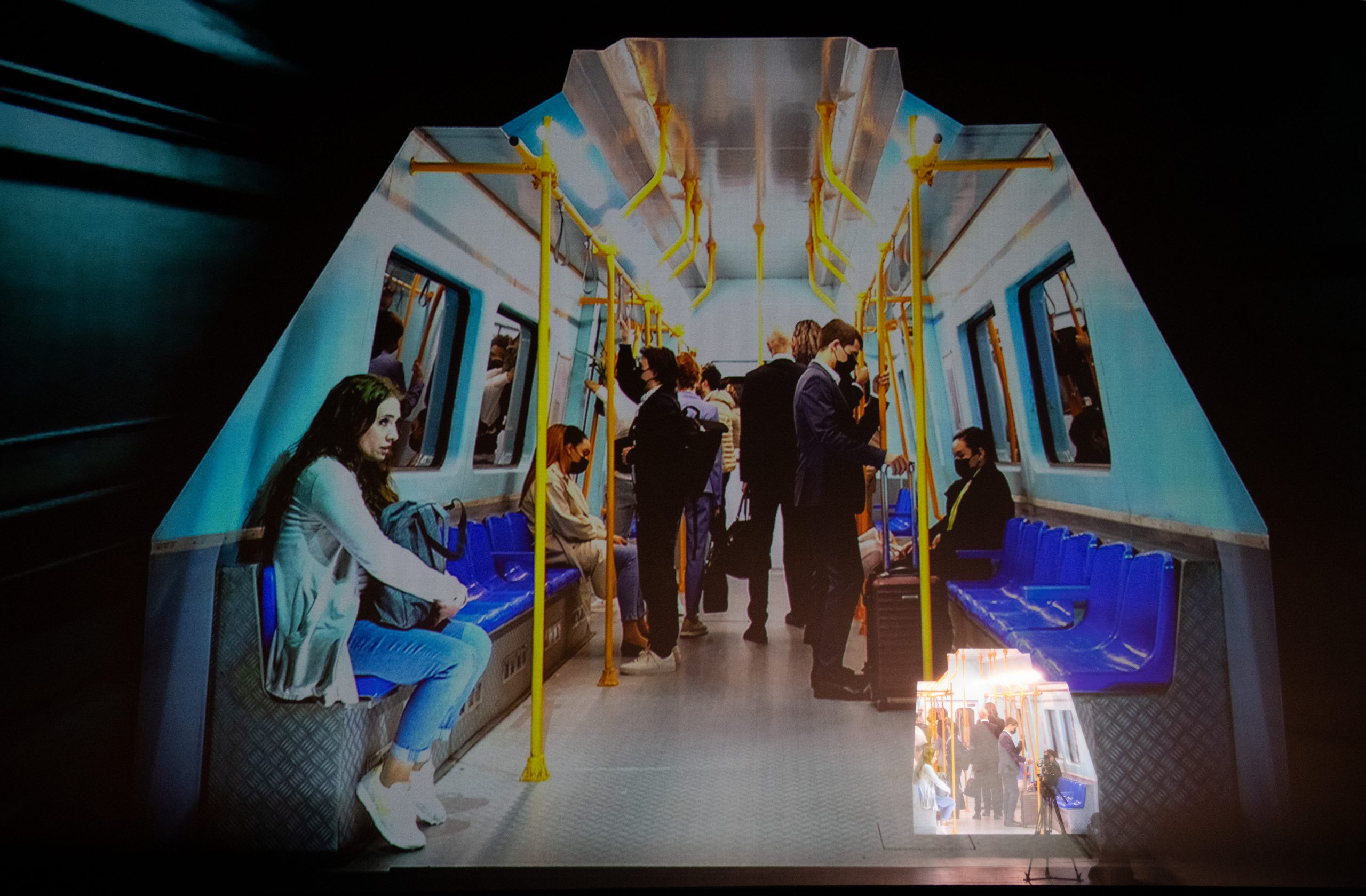 France Gounod, Faust: Soloists, Chorus and Orchestra of Opéra national de Paris / Lorenzo Viotti (conductor). Recorded (directed by Julien Condemine) at the Opéra Bastille, Paris, and broadcast on 26.3.2021. (JPr)
France Gounod, Faust: Soloists, Chorus and Orchestra of Opéra national de Paris / Lorenzo Viotti (conductor). Recorded (directed by Julien Condemine) at the Opéra Bastille, Paris, and broadcast on 26.3.2021. (JPr)

Production:
Director – Tobias Kratzer
Set and Costume design – Rainer Sellmaier
Lighting design – Michael Bauer
Video – Manuel Braun
Chorusmaster – José Luis Basso
Cast:
Faust – Benjamin Bernheim
Méphistophélès – Christian Van Horn
Valentin – Florian Sempey
Wagner – Christian Helmer
Marguerite – Ermonela Jaho
Siébel – Michèle Losier
Dame Marthe Schwertlein – Sylvie Brunet‑Grupposo
Old Faust – Jean-Yves Chilot
Tobias Kratzer’s cinematic new production of the Charles Gounod’s 1859 Gallic warhorse Faust was mightily impressive notwithstanding that France is struggling to get to grips with an unending pandemic. It seems the Paris Opera has been allotted extra government funds to survive the enforced closure and most of it looks to have been spent on this one production and what a success it is! I found Kratzer’s Berlin Der Zwerg, Bayreuth Tannhäuser and London Fidelio inconsistent (though that would need more explanation than I can give here and reviews are on this site) but Kratzer hits a home run – or more appropriately shoots a three-pointer (see below) – with this Faust. The three hours simply flew by (again literally).
Gounod and his librettists, Jules Barbier and Michel Carré, did not use Goethe’s Faust as their moral anti-hero and present us with a philosophical treatise but instead based their story on Faust’s romantic longings for Marguerite, something that has its origins in Goethe but does not occur in the Faust legend. Gounod’s Faust has a history of being an old-fashioned kitsch entertainment of the kind we do not expect modern opera managements and directors to countenance now. Not ostensibly be taken seriously despite the sad outcome for the heroine Marguerite, it is a melodramatic romcom with a devilish twist, one great melody follows another, and no opportunity is often lost for a song and/or dance. At the end, good triumphs over evil and Marguerite – in Gounod’s original – is rescued by God from damnation accompanied by a choir of angels proclaiming her salvation. Versions of the opera exist with recitatives or without, and Paris Opera’s Faust was sung-through with no spoken dialogue.
For Kratzer Faust is possibly an ageing academic – though he dresses more like a rich businessman – living in a booklined luxury apartment and we first meet him through his older incarnation (Jean-Yves Chilot) while Benjamin Bernheim sings at the side of the stage. Faust is reduced to having to pay for sex from much younger women and bemoans otherwise missing out on love and life. He curses science and faith and is determined to end his life with pills and booze though the girls he hears singing stops him. He calls on the Devil and Méphistophélès – looking rakish and in black – appears with six (also black-clad and masked) visible, yet invisible, spirits and promises him a return to the innocence of youth thanks to a potion he adds to Faust’s drink. This allows him to swop with his younger alter ego and – rather like Peter Pan taking Wendy to Neverland – Faust and Méphistophélès head out through the window to fly over the ‘The City of Light’ and past the Eiffel Tower (thanks to Manuel Braun’s videography) as we hear a drinking song (‘Vin ou Bière).
While some things about Act II are not entirely clear we see an impressive recreation of a basketball court whilst youngsters in streetwear – probably off to do their national service – are letting off steam for a final time fuelled by Red Bull. One of them is Valentine who is comforted by the crucifix his sister Marguerite has given him. There also is another student Siébel – a bespectacled geeky outsider – with an almost ever-present bouquet of flowers and he is infatuated with Marguerite. Faust joins in the game and Méphistophélès insults Marguerite and Valentine attacks him, and we see a role for those ‘invisible spirits’ as they disarm him of his knife (supposedly supernaturally). Eventually realising what they are faced with all brandish crucifixes in Méphistophélès’s direction and this forces him and Faust to flee. They are now shown flying E.T.-like across a full moon before arriving at a nightclub where Faust (by now in open-necked shirt and trousers) meets Marguerite (in striped top and shortish skirt) and immediately falls in love with her whilst Siébel watches on. She initially spurns his advances and Méphistophélès promises to help Faust win Marguerite’s love and we soon see Faust needing more of his elixir of life.
Act III really needs to be seen to be believed. It opens with a streetlamp near a few steps up to a block of flats with a recognisable door-entry system. Marguerite lives on the second floor in a simple flat furnished IKEA style which has a tiled bathroom (there’s always a bathroom!) and her neighbour the blowsy Dame Marthe Schwertlein (in leopard print blouse) lives in the apartment below. Marguerite takes her mind of Faust with a love story (Chanson du roi de Thulé) she appears to be blogging at her laptop. Dame Marthe brings along flowers (actually from Siébel) and a shopping bag with a jewellery box. We begin to see more of the role of the ‘invisible spirits’ as a couple have cameras to bring close-ups of the action we see. (At times there is almost too much to look at even on a screen and it could well prove to be confusing when this Faust eventually gets seen in the opera house.) Méphistophélès distracts Dame Marthe though eventually spurns her advances while Faust invades Marguerite’s flat and tries to kiss her. She initially resists him but when she is on the verge of giving into temptation Faust hesitates (and gets old again) so Méphistophélès takes over – and accompanied by orgasmic chords from Gounod – rapes a blindfolded Marguerite.

For the start of the fourth act, we meet Marguerite now several months pregnant and having an ultrasound scan accompanied by the ever-loyal Siébel. We will see Marguerite brooding on her fate and encountering Méphistophélès during a very realistic recreation of a Metro train ride. We are soon back where Marguerite lives and the youths return – though not all it seems – with their kit bags from wherever they went (don’t ask!) and Siébel tries to conceal Marguerite’s pregnancy from her brother, but he soon finds her being sick with her with head in the toilet. Méphistophélès cruelly mocks the situation with his serenade ‘Vous qui faites l’endormie’ and diabolical laughter. Valentine confronts Méphistophélès again and discovers his crucifix has little effect and he soon challenges Faust who Méphistophélès eggs on. Valentine ‘magically’ loses his knife, is badly wounded and dies cursing a distraught Marguerite as paramedics arrive too late to save him.
Faust and Méphistophélès fly through the starry night and during the ‘Walpurgis Night’ music a recognisably famous Paris landmark succumbs to an inferno(!) and by unseating some Gendarmes and taking their horses they gallop though night-time Paris, past the Moulin Rouge and up the Champs-Élysées. In horrifying close-up we see Marguerite drown her young baby in the bath. Soon we are back where we saw Faust living at the start of the opera though he has been stripped of all his possessions apart from a large mirror on the floor. The guilt-ridden Marguerite has by now only a tenuous grasp on reality and looks at one point as if she is reliving when she first met Faust. This Méphistophélès is there to show that you can’t dance with the devil without paying the devil’s price and now wants both their souls; however Kratzer delivers a deus ex machina and as we hear ‘Christ est ressuscité!’ (‘Christ is risen!’) there is redemption for Marguerite from an unlikely source (no spoiler this time!) leaving her sobbing and Faust old once more.
The camerawork was almost like cinéma verité and there was no hiding place for a cast of outstanding singing actors and an equally exceptional non-singing one (Jean-Yves Chilot). They have clearly bought into Kratzer’s Konzept and been thoroughly rehearsed. Faust was one of the first opera I ever saw at Covent Garden and in 1974 Stuart Burrows and Kiri Te Kanawa were Faust and Marguerite; more significantly the incomparable Norman Treigle was an unforgettable Méphistophélès in what sadly proved to be one of his last performances. In the next decade I was also fortunate to see and hear Alfredo Kraus in the title role. Do their like still exist? Well, this Paris Opera Faust makes the case that they might, though of course I was not in the theatre to hear them and must judge their voices through loudspeakers.
Ermonela Jaho is a rather different type of voice than perhaps is usual for Marguerite, less coloratura and more lyric. Roulades and the highest lying parts of her role will be easier for Jaho if she gets to sing further performances as Marguerite, someone she has not sung for some time I believe. Certainly her – and Kratzer’s – Marguerite is no longer a shy, innocent girl living a sheltered life and Jaho was deeply affecting and at her best vocally in her later – and more anguished – moments as her character became increasingly unhinged. Benjamin Bernheim is a wonderfully stylish singer whose vocal technique is impeccable, his phrasing elegant, and rarely do tenors in modern times rise to the high C at the end of ‘Salut! Demeure chaste et pure’ with such grace and ease. Because he sang Faust so well Bernheim’s portrayal elicited more sympathy than maybe it should considering how he is shown to love and leave Marguerite in this production. The charismatic Christian Van Horn’s Méphistophélès was outwardly far too charming to be malevolent, though his evil machinations are carried out with a grim irony of which he is only too self-aware, and it was Van Horn’s deeply resonant bass-baritone voice which most revealed his potent threat to all concerned.
The role of Marguerite’s protective brother Valentin is relatively small and it is difficult to create a real, three-dimensional person but Florian Sempey’s expressive baritone made the most of cursing his sister (‘Ecoute-moi bien Marguerite) in Act IV. The excellent mezzo-soprano Michèle Losier was quite endearing as an ardent lovelorn Siébel and whilst Christian Helmer provided strong support as Wagner, there was also a memorable cameo from experienced mezzo-soprano Sylvie Brunet‑Grupposo as a man-hungry Dame Marthe.
Even behind their masks it was obvious the chorus were very committed and although their onstage sound perhaps wasn’t as robust as it might have been, nevertheless, they entered into the drama spiritedly. From what I heard Lorenzo Viotti’s conducting was exemplary emphasising all the lush textures of Gounod’s score and the music was full of character and colour as a result.
The initial transmission of Kratzer’s Paris Opera Faust restricted to France with the prospect of it appearing in cinemas around the world at a later date. However, it can be found (at the time of writing) if you look for it online, but regardless of how you can see it in the future I urge you not to miss the chance.
Jim Pritchard
For more about Opéra national de Paris click here.

Transplanting a 19th century opera into 21st century realities inevitably brings with it more than a touch of anachronistic element. As the 19th century libretto is sung in 21st century bathrooms with cellphones and LCD TVs in the background, it creates a jarring experience to those who have seen/heard ‘Faust’ in a more traditional setting.